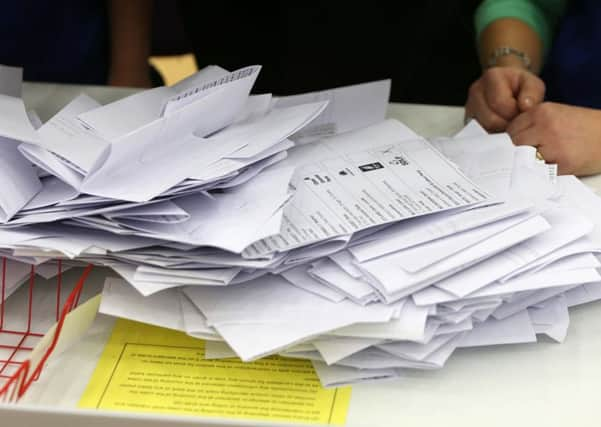Ben Lowry: Why it is important to vote all the way down your ballot paper


There are so many imponderables that putting them all together and predicting the outcome is akin to filling a blender with a number of ingredients, some of them new, and then accurately anticipating the emerging food.
The context of the Renewable Heat Incentive scandal is an obvious major factor in this election, but it remains to be seen if it is the key one.
Advertisement
Hide AdAdvertisement
Hide AdIt might be trumped by the growing division over legacy and cultural matters.
Brexit, and how people feel about it only months after the referendum result (and when passions have not entirely subsided), ought to be a third key element to this election. But I have heard it discussed less than I had expected.
Then there is backdrop of the electoral turbulence that has led to protest votes and extraordinary outcomes across the western world – as recently as Thursday when the Conservatives shattered every rule in the by-election book by taking Copeland off the opposition party.
This was said to be a vote against Jeremy Corbyn, but his election as Labour leader itself tore up the rule book – reaffirmed in the autumn when he won easy re-election despite overwhelming opposition of his own MPs.
It is far from clear why this turbulence is happening.
Advertisement
Hide AdAdvertisement
Hide AdI wonder if it is the emergence of the first generation to have been born of baby boomers, and so is a manifestation of the final breakdown of tradition.
Yesterday (Friday) I interviewed the former Greek finance minister Yanis Varoufakis and he has another theory, that you can read next week.
The Assembly election of last year suggested that Northern Ireland will stand largely outside the turbulence that is affecting other countries.
But it is worth noting that at the last election there was a noticeable move away from the main parties. Smaller parties and independent candidates did rather well.
Advertisement
Hide AdAdvertisement
Hide AdIf you add up their share of the vote to the Alliance and the Greens totals, they got almost 17% of the total vote between – up 7% on 2011.
It seemed at first sight that the smaller parties and independents had not done well last May, but this was because they struggled to win seats.
They might struggle even more on Thursday, because the reduction to five seats in each constituency will increase the quota threshold.
In Thursday’s News Letter election supplement, Nicholas Whyte predicted that most Alliance seats were fairly secure.
Advertisement
Hide AdAdvertisement
Hide AdOutright independents will probably poll less votes than 2016 because there are fewer well-known candidates like John McCallister and Brian Wilson (formerly of South and North Down respectively).
But a figure to watch on Friday will be the number of first preference votes that goes to the non tribal parties. Young people seem more relaxed about the community divide, and less aware of it.
In theory parties that are neither unionist nor nationalist should edge up at every election as a new generation, that has no memory of the Troubles, keeps emerging.
It is the generations that are at least 10 years older than me (I was born 1971) that remember both the whole of the Troubles and the years before it so they know the full context.
Advertisement
Hide AdAdvertisement
Hide AdBut increasingly I am struck by the fact that there are people who are almost 30 yet have little or no recollection of the time before the first IRA ceasefire of 1994.
That is wonderful (if the people who did not live through the violence do not draw the wrong lessons from that time). Where it will end politically is anyone’s guess. It might well in a decade or two lead us on to an entirely different form of politics.
That is not going to happen in this election, even if the centre ground does edge up.
My role at the News Letter is such that I get to see a lot of reader comment and feedback and monitor a lot of what is said on social media.
Advertisement
Hide AdAdvertisement
Hide AdMy sense is that the rank and file unionist voter is indeed angry about RHI, but again and again I notice people writing that however bad it was, the IRA was incomparably worse.
I would imagine that people not voting at all is a scenario that is causing concern to the DUP at the moment.
Pundits will be scrutinising whether the Ulster Unionists benefit from RHI, or are hurt by the Nesbitt SDLP controversy, or neither.
Another thing to watch is whether unionists who are annoyed about RHI, but who are still emphatically unionist, turn to the TUV in noticeable numbers. The party has never done well, aside from contests or seats in which Jim Allister has been standing.
Advertisement
Hide AdAdvertisement
Hide AdOne thing I always recommend to voters is to vote far down the ballot paper. If, for example, there is a candidate to whom you are particularly opposed, vote all the way so they are last.
Every election I attend counts where someone scrapes in on a very late count, sometimes by a margin of a few dozen votes.
By that stage, hundreds if not thousands of voters have lost influence in who got the last seat because they did not vote all the way down their ballot and so their vote is no longer being transferred.
• Ben Lowry (@BenLowry2) is News Letter deputy editor